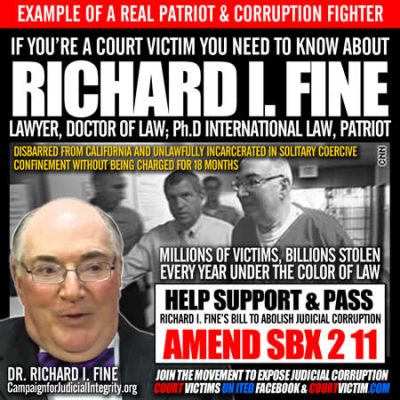SBX 2 11 gave retroactive immunity from California criminal prosecution, civil liability and disciplinary action to the judges?

Contact and keep contacting California’s State Senators and State Assembly Members and urge them to support and enact the Campaign’s Amendment to SBX 2 11 (also known as the “Fine Amendment”) until the Amendment is enacted. Contact and keep contacting County Supervisors in all counties making illegal payments to judges and demand that they stop the illegal payments until all illegal payments end. Vote out all incumbent judges in every election in the counties where counties and/or courts give payments to judges until the payments stop and each judge who took a payment is out of office. Contact and keep contacting the President, U.S. Senators and Congressional Representatives urging the President to institute an Executive Order requiring prosecution and other actions and urging the Senators and Representatives to institute investigations into: (1) the reasons why the U.S. Department of Justice: (a) did not prosecute the judges for violating (i) the supremacy and due process clauses of the U.S. Constitution requiring them to follow the U.S. Constitution and U.S. laws; and (ii) 18 U.S.C. Section 1346 (the intangible right to honest services) for taking illegal payments from counties that were appearing before them as parties; (2) the reasons the U.S. Department of Justice or the IRS did not prosecute the judges and counties for not paying taxes on the illegal payments into the judges 401K plans when the judges were not employees of the counties amongst other things; (3) whether the U.S. Government violated any laws by making Title IV and other payments and grants to the State of California, the California Courts and Judiciary and California Counties when the counties and the judges were violating federal law; and (4) whether such U.S. Government payments should immediately stop and remain stopped… Read More



